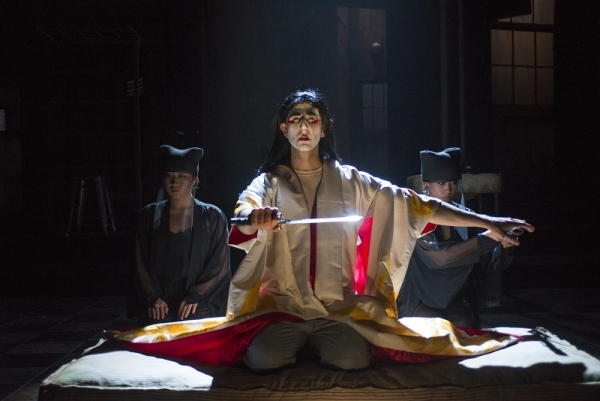M. Butterfly

(© Michael Brosilow)
Gender, race, and sexual orientation. Three things that, at least outwardly, tend to define how the world sees and treats you. Thankfully, today the strictures that determine those deeply ingrained characteristics aren't as rigid as they were as recently as 26 years ago, when David Henry Hwang's M. Butterfly first debuted. Which only goes to show just how far ahead of its time the Tony Award-winning play was.
The Court Theatre's blistering, heartwrenching, and acidly funny revival of M. Butterfly shows that this text is as sharp and provocative as it was when it was first produced. Astutely directed by Charles Newell, the gender-bending tale of love, misogyny, imperialism, and racism has enough bite to draw blood, enough romance to make you sigh, and enough humor to make you laugh out loud. And while M. Butterfly may be a lushly imagined love story, it is also a crackling political thriller.
Setting his narrative during the fractious decade from 1960 to 1970, Hwang borrows the bones for his story from Puccini's opera Madama Butterfly. As a French diplomat in Beijing, Rene Gallimard (Sean Fortunato) falls in love with an opera singer whom he calls Butterfly (Nathaniel Braga). The exotic, (to Gallimard) exquisite performer is a hetero-male fantasy in the flesh: Butterfly is demure, alluring, unabashedly worshipful of her lover, and available 24/7. For Gallimard, an awkward, self-loathing, needy dweeb who has spent a lifetime intimidated and humiliated by women, Butterfly's slavish adoration is a balm that transforms him from pathetic loser to alpha-male lover. He takes the adoration as his birthright.
It's tough to write about M. Butterfly without indulging in the plot's major spoiler, but the program itself suggests Gallimard's fantasy ideal isn't what she seems. Butterfly has more in common with RuPaul's Drag Race's Gia Gunn than Madama Butterfly's Cio-Cio San. How she manages to keep her true identity hidden through years of sexually charged assignations is the puzzle at the heart of M. Butterfly. The answer unfolds gradually, as a fascinating exploration of the diplomat's damaged psyche and needy, narcissistic heart.
Under Newell's assured hand, the narrative corkscrews through layers of mind games and political intrigue of increasingly higher stakes. These days, displays of overt Western Imperialism may be subtler than they were in the decade that launched the Vietnam War, but M. Butterfly still stings with timeliness. Gallimard and his colleagues see Eastern Asia as their own personal toy box, a place ripe for plunder, populated by a race that's easily dominated and dismissed. Such ignorance-based pride can only lead to a bruising downfall, and so it does in M. Butterfly.
In Hwang's elegant dialogue, matters of global importance play out through the journeys of individuals. The fates of nations are at stake. They are filtered not through maps and abstract military tactics, but through the indelible faces of Gallimard and Butterfly. In all, M. Butterfly is an exquisite example of the political as personal. It is also a tour de force for both Fortunato and Braga. Both turn in exhausting, enrapturing performances.
Gallimard's journey is epic: He moves from timid frustration and entitled arrogance, and finally, to shattered disbelief at the deeply ironic twist of fate that destroys him. It's a vast emotional journey, and Fortunato hits the heights and the depths with a fervor and an honesty that makes you feel every step of the way. Braga is equally powerful, creating a Butterfly that is as layered as a set of Chinese boxes. Ably capturing the tantalizing, dangerous mystery that Butterfly represents, Braga is part Mata Hari, part geisha girl, and part reverse-engineered James Bond.
Playing out on Todd Rosenthal's sleek, minimalist set, Newell's ensemble provides both rich context and memorable supporting characters. As Gallimard's long-suffering wife, Karen Woditsch is a mirror image of Butterfly, a hardy, plainspoken matron who doesn't hesitate to challenge her often insufferable husband. Also memorable is the trio of black-clad dancers (Aurora Adachi-Winter, Erin Clyne, and Sarah Lo) who serve as a kinetic, silent Greek chorus choreographed by Jamie H. J. Guan. Lydia Tanji's costume design enhances both the characters and the narrative, capturing the East/West culture clash in an elaborately rendered mix of colorful kimonos and monochromatic businesswear.
M. Butterfly doesn't flutter — it soars. It succeeds as a scathing warning to those who would imperiously reduce an infinitely complicated world to ethnic and gender stereotypes. And it fascinates as a perilous love story between a damaged man and the fantasy that ultimately destroys him.











